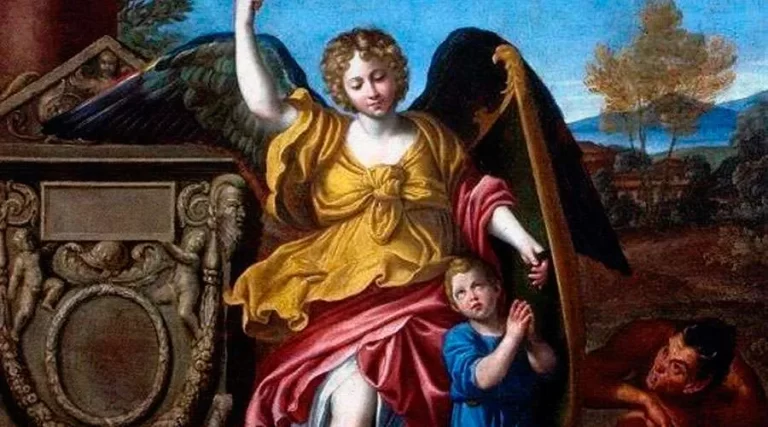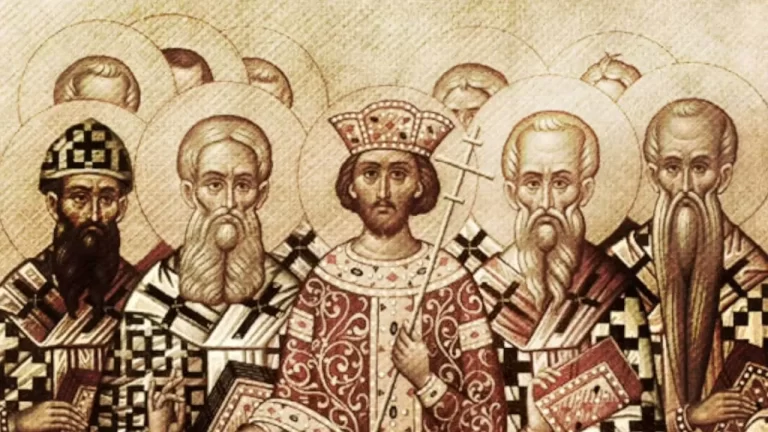Discover the human virtues of all Catholics
Human virtues of all Catholics, corresponds to a term related to the good actions that lead the human being to achieve peace and spiritual well-being, there are many virtues and through this article you will be able to know their concept and value.
human virtues
The term as such, refers to a disposition that each person has in order to do good, they are considered the moral heritage of man, they help enormously to balance the behavior of any person in different situations and circumstances.
What are the virtues?
Really, human virtues entail doing good above all things, so that every human being is obliged to have an excellent performance, in order to keep ethics and morals very high among their children and friends.
Getting away from the vices, brings the person closer to the virtues, it is not possible to maintain both situations in the usual behavior, so that, they do not have virtues or they do not have them. A person full of virtues is totally free in his acts, he does not depend on an action or habit that limits him from acting in any specific way.
Consuming alcohol, drugs and smoking are vices that apart from destroying the health of any person, enslave them and make them dependent and limited in their actions, the vicious person must constantly maintain a relationship with his addiction, so that he cannot consider yourself spiritually free, when you do not dominate those bad habits.
Establishing a path to obtain true benefits to be considered independent and free is the acquisition of virtues, in the Bible itself the following is established:
“Be perfect as your Father who is in heaven is perfect”
Virtue is the quality that allows you to face difficult situations and modify them in your favor, the qualities that a person possesses with respect to virtues, helps him to go against the negative current, it is an internal power that every human being must discover.
They are part of a way of life, where God gives us the tools to be able to develop and practice them every day. Each virtue is considered a positive quality and shapes the way of being of each one, allows shaping behaviors and even feelings.
For many years, various philosophers and thinkers have tried to give a clear explanation of what human virtues are, establishing conditions and concepts in each of their components.
According to Plato
This interesting Greek philosopher once stated that every human being has three great tools that allow him to establish a balance in his behavior:
- the intellect
- The will
- The emotion
It also states that each of them contains a virtue, such as wisdom, self-control and courage, in this case wisdom allows identifying which actions are correct, and establishes when they can be carried out, for its part the value creations superior to those that appear during the threats, in order to defend their own ideas.
Self-control encourages behaviors that lead the person to relate correctly with others, regardless of the adverse situations that may arise.
According to Socrates
Socrates raises that virtue is what allows man to resolve qualifications that helps him distinguish good from evil, respect for disrespectful, and define the beginning and the end, these virtues are acquired through a good education that is It must be based on the moral learned on a daily basis.
Moral intellectualism, as Socrates called it, in wisdom and ethics, tools defined only for rational beings, where each person must act according to reason, avoiding being carried away by lascivious, passionate and vicious acts. On the other hand, he states that a person who acts in good faith with positive actions generally has the ability to obtain wisdom.
According to Aristotle
- This great thinker established various ways of appreciating and valuing virtues, let’s see:
- The so-called dianoetic or intellectual virtues, differentiated into those of the theoretical intellect: Intelligence, Science and wisdom.
- Own practical intellect: Prudence. art, discretion, insight and good advice.
- Ethical or character virtues, classified as belonging to self-control such as strength or Courage, temperance or Moderation, modesty.
- Referring to human relations such as justice, kindness, kindness, truthfulness, good humor, sweetness and magnificence.
According to the Stoics
These thinkers establish that the virtue of an action that every man must perform according to his nature, in a way that allows him to act as a rational being without harming anyone or himself, avoiding being carried away by affections, vices, passions and temptations. , so that any internal irrational act must be eliminated through self-control.
The gifts of the Holy Spirit
There are various permanent dispositions closely related to charity, which allows man to become a docile being that helps to follow the inspirations given by the Holy Spirit, and they are the following:
- The wisdom
- Strength
- The intelligence
- piety
- The advice,
- The science
- The fear of God.
Each one of these gifts belongs to the glory and fullness of Jesus Christ, however the most important virtue for the Church and Catholicism is charity, it represents the most relevant divine virtue, it allows the infused habit, the inclination of the will of man to love God for Himself above all things and man for the love of God.
The cardinal virtues
It is believed that Catholicism establishes four virtues that play a vital role in the actions of the Catholic faithful throughout the world, they are considered very important and the rest of the virtues are grouped according to them, these are:
- Prudence
- Justice
- Strength
- Temperance.
Human virtues are the fruit of an effort, where they increase peace, well-being and glory towards God that every human being should possess.
Prudence
It consists of a virtue that allows people to discern about any circumstance in order to decide to do good towards oneself and towards other people, in them good sense and sober behavior are established to be able to define a positive action, some confuse it with shyness or fear, others with dissimulation.
Prudence leads to other virtues, especially towards knowing and carrying out actions of judgment and conscience, thanks to it moral principles can be applied in particular situations, allowing to overcome doubts that may exist regarding doing good and knowing evil, which should definitely be avoided.
Justice
It is part of human morality, since it allows to maintain a constant in the firmness of the will to give God and the neighbor only what corresponds to him, in religion this virtue is called “virtue of religion”.
His disposition is to establish in men the criterion of harmony based on equality and balance, the just man differentiates himself by promoting equity and good among all men.
Strength
It ensures firmness and strength in difficulties through perseverance, allows to dominate and control what is considered adverse, resists temptations and creates the conditions to overcome immoral obstacles. Help people to move towards sacrifice, in order to defend the just cause.
Temperance
It is a virtue that allows to moderate the attraction towards vices and pleasures, controls the balance towards the excessive use of material goods, allows the will to dominate over the instincts and regulates the desire for dishonesty.
A person with temperance, is moderate, is directed to control his most sensitive appetites, and likes to keep discretion, he was not carried away by irresponsible passion but by the true passion of his heart, although good passions are spiritual, a person should never be dominated for evil passions.
According to Catholicism, to live well, God must be present in the heart, through good deeds, maintaining the four cardinal virtues that represent the main line of all moral action of man, obeying God is an act of Justice, who does not being surprised by a lie is prudent.
The delivery of eternal love to God is in maintaining temperance, and not allowing any misfortune to destroy us and drive is within the virtue called strength, practice this type of action daily and the results are pleasant and pleasant
They consist of all the descriptions that Jesus formulates when he was giving the famous Sermon on the Mount, they are part of all the qualities that must be had in terms of charity, kindness, gratitude and faith. Let’s see:
“Blessed are the poor in spirit, for theirs is the Kingdom of Heaven.”
“Blessed are the long-suffering, for they will inherit the earth.”
“Blessed are those that weep, for they shall receive consolation.”
“Blessed are those who hunger and thirst for justice, because they will be satisfied.”
“Blessed are the merciful, for they shall obtain mercy.”
“Blessed are the pure in heart, for they shall see God.”
“Blessed are those who work for peace, for they will be called the sons of God.”
“Blessed are those who are persecuted for the sake of justice, because they are the Kingdom of Heaven.”
types of virtues
There are two types of virtues called theological and human virtues, each contain concepts that are directed towards doing good, in various ways we get the way to establish them, some closely related to others.
theological virtues
They are considered as positive and good habits and behaviors, which God granted to man in order to establish intelligence and his will towards other men, also to maintain an order in his actions, it is said that there are only three theological Virtues:
Faith
It consists of the virtue that allows man to believe in the power of God, in his revelation and in what for every Catholic means that the Church has granted to have confidence in a full life and full of well-being.
This virtue, whose word comes from the Latin fides, grants security and confidence in something, be it a person, thing, God and doctrine, is above any type of need that tries to demonstrate the truth.
It is used in various religions, for example in Buddhism where it is called “Pali Saddha”, and attempts are made to teach all the wisdom of Gautama Buddha where: it manifests as a conviction of something existing, determination to achieve personal goals and feel the joy that generates the practice of the previous ones.
In Islam it refers to a total obedience to the will of God, recognizing and affirming that there is only one creator and only him should be worshiped, in Judaism it is established as the mandate to recognize God through the mandates of the belief and understanding.
In Christianity it is a way of acting with respect to God, faith is based on the work and teaching of Jesus Christ, this leads to a more active life complemented with ideals and examples with the life of Jesus.
The hope
It is the virtue by which each person desires and expects from God, trust and eternal life, as well as knowing that they will receive the grace to deserve the spiritual promises of God. Saint Thomas Aquinas said:
“Infused virtue that enables man to have confidence and full certainty of achieving eternal life and the means, both supernatural and natural, necessary to achieve it, supported by the omnipotent help of God” .
It manifests itself on a religious level as waiting for the events that will happen by the will of God, it is a liberating action for every Christian, where the Divine glory is expected with faith to achieve peace and well-being.
Hence the concept of salvation where this divine decision will bring true spiritual freedom, the expansion of religious wisdom and the fullness of actions in each person, so that hope becomes an element within the theological virtues most expected by any catholic.
It is contained within the natural virtues also as a tool to make a very detailed description of the spirituality of a man, who must trust in the goodness of the creator above all things, waiting for the saving action.
Hope never ends if Christian values are very stable, although it can diminish and think that there is no longer goodness in the glory of God, it is important that every Christian never stop having hope in his heart and in his mind. For Catholics, God always provides, even if it takes a while, and for that it is devastating to have hope.
The charity
It becomes a theological virtue by which we love God above all things and give our neighbor that love that is so necessary and vital in our lives, it becomes a filial love where the hand of Jesus enters our lives.
The theological virtues are considered as the basis of love, towards God, towards one’s own person and towards others, so that the more we love God in the same way we should love our neighbor.
Of the three theological virtues, one of the most important is charity, with it perfection can be achieved, mortal sin is excluded and everything that can prevent the implementation of love for God is eliminated, every Catholic who has achieved this level superior of charity, live fully and maintain the beatitudes (Described above).
Charity is generally directed towards God, and later it is expressed towards ourselves, to then take it towards other people, in that order is where the broad criteria of true charity can be established. On the other hand, it is important to say that charity is lost when a mortal sin is committed.
If charity is lost, people must comply with the action of the sacrament of Confession or Penance, also through an act of perfect contrition, where it is mixed with the sacramental actions of penance.
Characteristics of the theological virtues
There are a number of definitions and descriptions that allow us to observe the characteristics of these virtues:
- Love God above all things
- It is rooted in human morality, each person has the duty to discover them, it resides in their own rational will.
- It establishes benevolence and friendship as vital elements in the love of God, which represents a reciprocal act.
- It has a very special reason regarding divine goodness and kindness in order to know faith through one’s own person.
- They have a very broad scope that covers the relationship between man and God, and establishes the divine goodness and the supernatural love of God towards men. This relationship allows to have God as the main element and man as a secondary element.
- They greatly influence every virtuous human action, that is, they are situations that allow man to create merits towards heaven, that is why they seek to establish the state of grace.
- It is sustained by three main stages that are, liberation from mortal sin through resistance to temptation, avoidance of venial sins and union with God through the repetition of acts of love.
human virtues
They are considered those where the feelings and the will that control the acts are available, allow us to order our passions and guide the man towards reason and faith.
The human virtues are many and are established in different lines of conduct and human behavior towards other people, these are Justice, strength, temperance and prudence, also called Cardinal Virtues (explained above).
What are virtues for?
Both virtues allow actions related to good to be carried out very quickly, which allows a state of happiness and joy to be maintained in every situation in life, as well as helping to promote human relationships, behavior and stable communication.
The human virtues are the most necessary in the maintenance of any work, family or social relationship, they are vital and although they come from God they are described only to strengthen relationships between humans, and maintain subordination to God the creator.
Is it possible to do good without virtues?
It is unlikely that this situation can be raised within the behaviors and relationships between people, although some philosophers have been able to show that many actions can be done without counting on the virtues, it is concluded that there may be contradictions and hence problems for be able to carry out actions of good.
Without the human virtues, man is limited to performing good deeds, it is only a particular desire, which can be carried out only once but does not allow the subsequent consequence and using notorious efforts that wear out and diminish spiritual energies.
Should one believe in all the virtues?
Generally the answer is yes, since they are revelations from God it is impossible for them to harm human beings, so that enormous confidence is created in faith in God, it is important to believe in all of them and even in those proposed by the great elites of the world. Catholicism.
Denying a truth directly implies not being a Catholic, that is why each believer must take into account their commitment to God by establishing the belief in the virtues, mistrusting them is how not to trust God.
If a believer does not carry out the action where he can develop the virtues, he becomes a person who will soon begin to have many problems, to try not to falter with respect to the belief of the virtues, hope and faith must be maintained on God.
These tools allow hope to be consolidated and do not allow it to disintegrate or be lost. The Church’s activities help enormously to maintain and reinforce the actions that generate each of the virtues, based on trying to do good throughout life.
How to become Catholic again
Some people for various reasons come to mistrust and deny the actions and foundations of Catholicism, for this the following is necessary, to commit once with God without any doubt, having the faith that grace will be received.
To use repentance as a vital tool to eliminate the spiritual disorder where one has fallen, it must be borne in mind that previously those who have reneged on the faith must also request authorization to seek absolution from excommunication, for having fallen into sin.
the premise
“whoever remains in God never sins”
It is a way of knowing and trusting in all the actions of the virtues, in the case of charity this can vary and be modified according to the circumstance and the strength that each Catholic has inside.
The possibility of losing it is not a guarantee for anyone, although it may decrease with sins, the serious fault is not enough to consider that charity has been totally lost. Every human being must understand that he must get up on his own, always counting on the tools of the virtues, granted by God.
Some theologians propose the use of alternatives with respect to the virtues and have called them “alternate virtues” that are related to spiritual elevation seeking resemblance to God.
For its part, prudence maintains contemplation for divine things, protects itself based on this situation, puts aside earthly things and focuses on the thought of the soul, temperance helps any Catholic to trust even more in the faith in God.
The strength for its part eliminates the fear of abandoning life and faces the situations of the afterlife, justice approves all the virtues mentioned above. With this, it is sought to obtain degrees of perfection in the souls, which are already purified and firmly united,
It is believed on a religious level that one’s own strength removes the fear of abandoning this life, and facing the life of the afterlife; the court approves the aforementioned provisions. Ignoring earthly desires is one of the most important actions of temperance, which serves as food for Catholics who seek confidence in the faith.
Other opinions
There are many religious philosophers who think that the human virtues really are ten, since everything that comes from the human spirit are types of perfection of the person himself, some agree on this criterion, others raise somewhat different opinions, but for example to achieve Glory eternal the Church names the following human virtues:
- Joy is a form of the intensity of the senses, it is natural in human beings and reflects in the spirit an enormous joy and is the fruit of the Holy Spirit, it is part of the second virtue named by Saint Paul in his letter to the galgas .
- Peace is the sense of tranquility and mental and spiritual relaxation that a person can count on
- Patience represents the ability of any human being to suffer and tolerate misfortunes and adversities that arise in their lives.
- Kindness, is the behavior that must be had to do good, is considered a form of spiritual virtuous behavior that not all human beings dominate.
- Meekness is the fruit of the action of the holy spirit, where any person who considers himself a Christian, keeps under control the anger and the disorder that it generates.
- Fidelity is the firmness and constancy that people maintain of their ideas, thoughts, obligations and actions, in order to achieve spiritual goals.
- Modesty is the quality that we have to moderate our actions and thoughts, preventing us from believing more than it really is, it regulates feelings by putting vanity, arrogance, presumption, among others, at bay.
- Continence applies a lot to actions that moderate sexual acts, desires and is related to chastity.
- Chastity is a virtue that excludes and isolates appetite and sexual acts, it is considered a virtue within temperance, where desires must be controlled.
Relevant human virtues
We have already seen a number of theological and human virtues where the reason for their existence and what they are for has been described, but there is a huge number of virtues that are also very relevant, they could be called secondary but they have equal relevance in behaviors and actions human.
They are still important and are presented as elements and tools that God granted to man in order to obtain spiritual and religious benefits, in order to lead a calmer life and in accordance with the moral guidelines of humanity.
Resilience
It is a type of virtue granted to the human being in order to move forward regardless of the obstacles in front of them, disappointments and defeats are accepted, and they are always by the human being’s side, they help lift the spirits of other people.
Empathy
It serves to connect with another person through similar experiences, as well as the strength to put yourself in the other person’s shoes and internally understand their situation.
The sacrifice
It is the ability to put aside their own situations and face and solve those of others who need it, sometimes these people lack spiritual tools and they must be fully helped to obtain them and solve adversities.
good manners
They are part of human kindness and courtesy, they are part of the basic rules for coexistence and human relations, they are related to tolerance, since an educated person has to put up with others who have a different criterion.
Sense of humor
It is considered a virtue where character makes a difference, being with a good sense of humor allows you to solve things in a better way, you think better with a calm and happy mind.
List of human virtues
Below we will describe a long list of all human virtues, we will describe the most unknown and we will detail some that are unknown to some, let’s see:
- Restrained, a person who is moderate, does not exaggerate or is aggressive or disrespectful.
- Ambition, consists of the intense and tenacious desire to achieve a difficult thing, especially wealth, power or fame.
- Adaptability, which can be adapted to any situation.
- Affability, related to kindness and consists of a person’s attention in dealing with others.
- Affectivity, are the good feelings that one person feels towards another.
- Mildness is a virtue that is related to being free from abruptness and violence, resulting in a calm and pleasant person.
- Doing, it is said of someone who has the virtue of performing tasks without bothering or complaining.
- Authenticity is a virtue that allows the person to show their true personality without hiding any behavior in order to obtain benefits, they obtain them for their particular qualities.
- Bold, is the virtue of a person who has the ability to undertake unusual activities regardless of the difficulties or the risk involved.
- Brilliance, consists of the action where a person stands out from their natural line, they have special characteristics and properties.
- Well-being, more than a virtue, is a mental state, where the person creates physical and spiritual conditions that provide satisfaction and peace.
- Capacity, is an action that allows to have the natural tools to carry out any action or activity, few people have this great virtue.
- Circumspection, consists of the seriousness and the way in which a person expresses his state of personality and character, when speaking and behaving.
- Commitment, is the virtue of every person to maintain an obligation contracted from an activity, action or other situation and must be maintained.
- Contentment, is a virtue related to joy and consists of mastering negative and adverse actions of enmity, having elements to re-establish good friendship ties with other people.
- Creativity, is considered the action where a person has the ability to create beneficial situations for himself and his environment in a positive way.
- Detachment, are the actions and virtues of a human being when he puts aside his personal actions and faces those of another person.
- Devotion, Feeling of respect and admiration towards God or towards other people, is inspired by the dignity, virtue and merits of the other person, institution or cause.
- Effectiveness is the virtue relative to effectiveness, which is nothing more than carrying out activities and actions quickly and with quality.
- Empathy, Participation in matters of affection of a person in the reality of another, in most cases with respect to feelings.
- Entrepreneur, are actions that allow decisions to be made through initiatives full of risk and difficulty.
- Frankness, Attitude that expresses what you think or feel with sincerity, clarity and transparency, sometimes you seek not to harm, but sometimes it is inevitable to use frankness.
- Integrity, consists of moral integrity in the ability to fully perform an action, without leaving bad situations around
- Intellectuality, is related to a group of people who come together to develop actions of good towards their social environments, based on the analysis of processes and intelligent ideas.
- Modesty, is a very interesting virtue that allows people not to flaunt their successes and qualities, it is closely related to humility.
- Passion is a form of feeling that people carry out letting themselves be carried away by logical reasoning, they establish actions without taking into account the consequences of their actions, it is a virtue that if not controlled can become a negative act.
- Insightful, it is believed that people have the ability to look beyond situations and anticipate events, perceive details from a great distance.
- Providence, in the spiritual sphere, consists of the care of the planet and of men, where the faithful of some religion attribute to God.
- Prudence is the ability to analyze certain events or actions that generate a risk and the possible damage that they may cause, adapting the conditions to avoid them.
- Receptivity is related to the ability to receive external stimuli.
- Reserved, who does not express his feelings and ideas spontaneously or lightly.
- Sacrifice, consists of the effort, or action that a person imposes on himself to achieve or try to deserve something in order to benefit another.
- Sagacity, is a virtue that some people have to understand things more easily, perceiving ideas more clearly and carrying them out in a simple way.
- Sobriety, condition that keeps the person free from negative actions and vices.
- Truth, he the main virtue of God, after love, for man represents the thought or affirmation that is expressed in a clear, direct and sincere way, clearly demonstrable.
The rest of the human virtues known to all and that do not need to be described, are mentioned below:
- Affectivity
- Be nice
- Happiness
- Amiability
- Friendship
- Love
- Harmony
- Attention
- Self-confidence
- self knowledge
- self control
- self-criticism
- Self esteem
- Beauty
- Goodness
- Good character
- Good communication
- Okay
- warmth
- Calm
- Character
- Sweetie
- Caution
- Collaborator
- Funny
- Fellowship
- Compassion
- Comprehension
- Communication
- Awareness
- Confidence
- Considered
- Constancy
- Cordiality
- Sanity
- Courtesy
- constructive criticism
- Decency
- Decision
- Determination
- Diligence
- Dynamism
- Diplomacy
- Discipline
- Discretion
- Healthy fun
- Docility
- Generalship
- Sweet
- Ecology
- Education
- Emotions
- Charming
- Energetic
- Enthusiastic
- Equity
- Balance
- Hope
- Spontaneity
- Ethics
- Exuberant
- Happiness
- Fidelity
- Flexibility
- Strong
- Generosity
- Generosity
- Grace
- Gratitude
- Honesty
- Honesty
- Imagination
- Impartiality
- Independence
- Ingenuity
- Initiative
- Intelligence
- Intuition
- Justice
- industriousness
- Loyalty
- Liberal
- Meticulousness
- Moderation
- Moral
- Nobility
- Obedience
- Objectivity
- Optimism
- Order
- perfectionism
- Perseverance
- Persistent
- Can
- practicality
- Neatness
- Puntuality
- Rationalism
- Resistant
- Respect
- Responsibility
- Romanticism
- Wisdom
- Security
- Simplicity
- Sanity
- Sensitivity
- Serenity
- Helpful
- Sincerity
- Sociability
- Solidarity
- Overcoming
- Tolerance
- Worked
- Tranquility
- Transparency
- Courage
- Shameful
- Versatility
- Will
Grace and human virtues
These two conditions are closely related and are linked between the situation of man with respect to his position towards God. In the case of human virtues, they are acquired through education, they are reinforced with it through deliberate acts and through perseverance.
Human virtues along with divine grace endure over time through effort and are purified by divine grace, God helps loosen the character and give solvency to behaviors aimed at doing good, when a man is virtuous in practices, they maintain your happiness.
Divine grace allows to place the virtues in a privileged place in the conduct of man, Jesus Christ allows to maintain the balance of those qualities through the particular request that each human being must make of faith
It is important to know that these non-theological virtues are related to grace only and only when they are carried out in a spiritual way, and as we could see in the descriptions of human virtues, some are not related to the glory of God, which can lead to to develop good actions but not in accordance with spirituality.
The Virtues and Saint Thomas Aquinas
Most Catholics know the actions that led Saint Thomas Aquinas to make him a Saint, his premise “A virtue without prudence is not a virtue, has been one of his most important remarks on the subject in question.
This great priest and later Catholic saint was born in 1224, in Italy, the son of a very powerful family, who had differences with the orders of the preaching brothers, Thomas was arrested by his own brothers, who, seeing his religious vocation, decided to make that decision. , in prison he began to study some theology through the learning of certain passages of the Bible.
The idea of imprisonment was in order to eliminate the spiritual and Christian ideas that Tomás had in his mind, however they could not eliminate these criteria and when he left prison he decided to go to Germany to study theology, where he graduated in the area and later goes to Paris where they obtain a doctorate also in Theology
The Catholic Church recognizes him as a saint for his outstanding actions and contributions to metaphysics, logic, among other matters, but mainly in deep content referring to the 5 ways to know God.
With this criterion Saint Thomas Aquinas, presents the way in which the virtues can overcome the vices, states that “A virtue must be lived with prudence, since by taking it to the negative extreme (absence of virtue) it becomes a vice”, He also explains the following: “The extreme that we could call positive (despite the fact that it is not) is the one that occurs when virtue is taken to the extreme.”
He also says that when you live without prudence, you can even commit sins. For him, Modesty represents: “Humility, lack of vanity and no ostentation of one’s own merits.” It is the midpoint between what should be done and what is ignored, attributing more than deserved.
With respect to shamelessness, he explains that it is an act of insolence and lack of modesty, with respect to shyness, he explains that it consists of a lack of security in one’s own person, where fears surround the being and clean actions to converse in public and relate with other people.
Classification of the virtues according to Saint Thomas Aquinas
His great ideas regarding human virtues led him to classify them into two types: moral, intellectual and theological.
Intellectuals
It refers to the habit of understanding, a consequence of practices and that can be carried out thanks to the will and due knowledge of things.
Morales
It establishes the habits of the soul as references that are acquired over time, through practice, leading everyone to obtain a calm and healthy life.
Theological
Defined above, but from the point of view of this saint, they represent God as the being who grants the will and intelligence to act divinely, in order to get rid of negative and selfish earthly impulses.
When these classifications are analyzed, we observe in Santo Tomás a clear idea of what he had in mind and analyzed with respect to the virtues, they are better understood and some things are clarified, for example when a habit is positive the results are directly equal to its main action.
If this habit is taken to the extreme it immediately becomes a vice, habits are seen as something good up to a certain limit, where the human being himself can disqualify himself and modify them until they become something harmful, this analysis of Saint Thomas has a very great value , especially for Theology students, who are looking for answers in their learning process.
final analysis
From the spiritual and religious point of view, virtue is a habitual and firm disposition to do good. With respect to human virtues, they are more stable to understand and depend on their own will to be able to regulate their actions, help balance and organize passions and guide behavior, established according to reason and faith.
And as we said at the beginning, they are based on four main actions: prudence, justice, strength and temperance. Each one establishes criteria where the circumstances define how good should be done and choose the fairest means to carry it out.
The moral virtues grow little by little, they are reinforced with education, deliberate and spontaneous acts and with perseverance, always supported by divine grace that purifies them when they are done with good faith.
The theological virtues establish Christians to live in relationship with the Holy Trinity, being its origin in God, where each one must manifest their virtues through faith and love towards him. That is why these virtues, faith, hope and charity, surround and give life to the rest of the moral virtues.
Some believe that every vice and adverse action can be eliminated through the use of virtues, for example:
- Pride is fought with humility
- Against greed, generosity.
- Against lust, chastity
- Anger is fought with patience.
- Gluttony is removed with temperance.
- Envy is fought with charity.
- laziness is excluded with diligence.
All these actions are easy to carry out if each person has the necessary strength to do them, the limitations to get out of negative actions and vices are imposed only by man, God gives us spiritual tools, such as virtues to be able to reach to the goal of well-being and inner peace that every human being needs.







